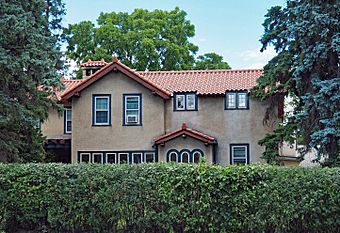W.T. Bailey House facts for kids
Quick facts for kids |
|
|
W.T. Bailey House
|
|

The W.T. Bailey House viewed from the south
|
|
| Location | 816 S. 5th Avenue, Virginia, Minnesota |
|---|---|
| Area | Less than one acre |
| Built | Circa 1921 |
| Architectural style | Spanish Colonial Revival |
| NRHP reference No. | 80004357 |
| Added to NRHP | December 4, 1980 |
The W.T. Bailey House is a special old house located in Virginia, Minnesota. It was built around 1921. This house is known for its unique look, called the Spanish Colonial Revival style. It was once the home of W.T. Bailey, who started a very important lumber company in the city.
Contents
About the W.T. Bailey House
The W.T. Bailey House was built nearly 100 years ago. It stands out in Virginia, Minnesota, because of its interesting design. The house was built for W.T. Bailey, who owned the second-largest lumber company in the city.
A Special Style
The house is built in the Spanish Colonial Revival style. This style became popular in the early 1900s. It often includes features like stucco walls, red tile roofs, and arched doorways. These elements make the house look like homes found in Spain or parts of America with Spanish history.
Who Was W.T. Bailey?
W.T. Bailey was a very successful businessman. He founded the Bailey Lumber Mill, which was a big deal in Virginia, Minnesota. Lumber companies were very important to the city's economy back then. The large and fancy house he built showed how successful he was in the lumber business.
Why Is It Important?
The W.T. Bailey House is considered a historic place. It was added to the National Register of Historic Places in 1980. This means it's recognized as an important building in American history.
What Makes It Historic?
The house is important for a few reasons:
- Architecture: It's a great example of the Spanish Colonial Revival style.
- Business: It shows the success of important business leaders like W.T. Bailey.
- Industry: It connects to the big lumber industry that helped Virginia, Minnesota, grow.
The house helps us understand how important lumber and mining were to the area. It also shows how successful people in these industries built large, beautiful homes.



